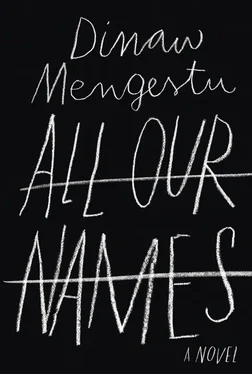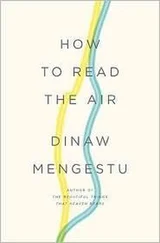That was the start of Isaac’s revolution, although neither of us knew it at the time. He posed variations of the same question to randomly selected groups of boys for a week. He called it his “interrogation.” He would say to me, “I’m going to interrogate those boys over there.” Or, “Who should I interrogate today?” And before I could respond he was off.
After the second or third time, I learned to watch without turning away. I saw that the risk of embarrassment and possibly even pain was necessary to the performance. He was pushed, threatened, laughed, and spat at, and, regardless, he returned to me with only a slightly dampened version of the confident glare he wore when he left. He could do so in part because he knew I was there watching, a witness rather than a mere spectator.
Isaac’s “interrogations” ended once it became obvious that enough students knew what to expect when they saw him coming for them.
“I’ve learned something important,” he said after he declared the end to his questioning. “All of the rich boys are named Alex. If they tell you something different, don’t believe them. Trust me — their real name is Alex.”
That same afternoon, he began to wave at any student who bore obvious signs of wealth, while calling out, “Hello, Alex. Very nice to see you again.” Or, “Alex, where have you been? Say hello to your friend Alex for me.”
It was an easy game for me to join him in. I followed him around campus yelling hello to the privileged boys; occasionally, when feeling bold, we approached a pair with our hands outstretched, and greeted them in unison as Alex.
By the time they realized they were being mocked, we had walked away. If they yelled for us to return, we never acknowledged them. Isaac kept his stride, while I had to concentrate not to stumble.
The only students on campus we admired were the ones who, like us, failed to hide the not-so-subtle marks of poverty. When I wasn’t with Isaac, I made a careful study of how they held their heads, if they looked down before speaking, and if close enough, what they said, what their voices sounded like when they spoke.
Isaac had other campus heroes as well. Of all the would-be revolutionaries, there was one group he never mocked. They were from Rhodesia — independence was still years away. No one on campus had a more powerful cause, which took the form of a single white banner unfurled each morning that read: AFRICA IS NOT FREE UNTIL WE ALL ARE. Isaac had introduced himself to them, when I was not around to see it.
“They’re from Rhodesia,” he told me, “but don’t use that word around them. If you say ‘Rhodesia’ they’ll tell you no such place exists. One boy told me that if I wanted to find Rhodesia I’d have to live inside of a white man’s head. I like them, but they don’t trust anyone.”
That was as close as he could come to admitting that they had not taken him seriously. He continued to watch them, but I never saw him so much as wave to them or look in their direction.
The real star of the campus for Isaac, and many others, however, was virtually invisible. He was supposed to be tall, young, handsome, and well read and wore only olive-green pants and shirts. Isaac claimed to have seen him from afar as he was leaving the campus. He said he was certain he was either Congolese or Rwandan. “He’s tall and serious like a Rwandan,” he said, “but it’s the Congolese who know how to fight. Maybe he’s both.”
“Maybe he doesn’t exist,” I said. “Maybe he lives only in the black man’s head.”
There was an article in the campus newspaper with the outline of a head and a series of quotes from students who claimed he was a myth. The next week, messages written in black marker began to appear on the buildings and supposedly in the classrooms as well. The most famous of them, which every student knew by heart, read simply:
Marx was a great man, and now he’s dead.
Lenin was a great man, and now he’s dead.
I have to admit, I’m not feeling so well myself.
Isaac loved that. “That man is something special,” he said over and over. He said it was proof that there were still real revolutionaries around, “not only rich boys waiting to be government ministers.”
The day after that message appeared, we scoured the campus in search of others. We found six more that day, five the next. On the third, every one had been painted over and replaced with a handwritten poster that said: “It Is a Crime Against the Country to Deface Our University Walls.”
“Soon,” Isaac said, “everything will be a Crime Against the Country.”
“I’m sorry,” I told him, “but it’s already a crime to say that.”
He held out his arms to be arrested.
“We should start practicing for this,” he said.
The following Monday, Isaac arrived on campus with a dozen fliers he had made, using stolen paper and markers. When I asked him where the paper came from, he clasped my shoulder and said, “Sometimes revolutionaries have to take what they need. Some take food, and guns. I take paper.”
We christened that afternoon the start of our paper revolution.
“Our first act of war,” Isaac said, “is to hang these up where everyone can see them.”
The fliers contained a new list of Crimes Against the Country.
“Why should they be the only ones who get to say stupid things?” he said.
That first flier listed four.
It is a Crime Against the Country to fail to report any Crimes committed Against the Country.
It is a Crime Against the Country not to know what is a Crime Against the Country.
It is a Crime Against the Country to ask what is a Crime Against the Country.
It is a Crime Against the Country to think or say there are too many Crimes Against the Country.
Isaac watched as I read and admired his work.
“I’m no poet like you,” he said. “Just a poor comedian.”
“We need one more,” I said.
Isaac handed me his marker.
I wrote the fifth and final crime on each of the fliers before showing it to him:
It is a Crime Against the Country to read this.
He put his arm around my shoulder and kissed the top of my head.
“Together,” he said, “we’re remarkable.”
We waited for midday, when the university shut down until the hottest part of the afternoon had passed, and then quickly posted the fliers on the entrances to the main buildings on campus. Isaac signed each one after we had taped it to the door: “The Paper Revolution Has Begun.”
When we finished, I suggested we go home. I still thought like someone afraid of ruining his chances of becoming a student.
Isaac shook his head no. “They’ll be gone by the end of the day, and we’ll have missed out on all the fun.”
Over the course of that afternoon, we stood outside of every building, Isaac right next to the doors, me a few feet behind him. It was better than we had hoped. A small rotating crowd of students hovered around each entrance. At one point someone tried to take one of the fliers down, but he was quickly pushed to the back of the crowd.
The next morning, when we returned to campus, the fliers and the paper revolution were all the students could talk about.
I knew my time with Isaac was temporary. His visa granted him one year, and we never discussed the possibility of extending it. I did, despite my best efforts to stay grounded, sometimes imagine that one day we’d drive together to City Hall, nicely dressed, carrying simple silver bands picked up from the town’s largest general store in our pockets, so that we could declare our marriage in front of a judge, in the hope that by doing so we would be able to make something permanent, a shared life which, as the saying goes, no man or woman could tear asunder. I imagined us living on a large farm, far away from any town and family, with only chickens and acres of corn for company.
Читать дальше












